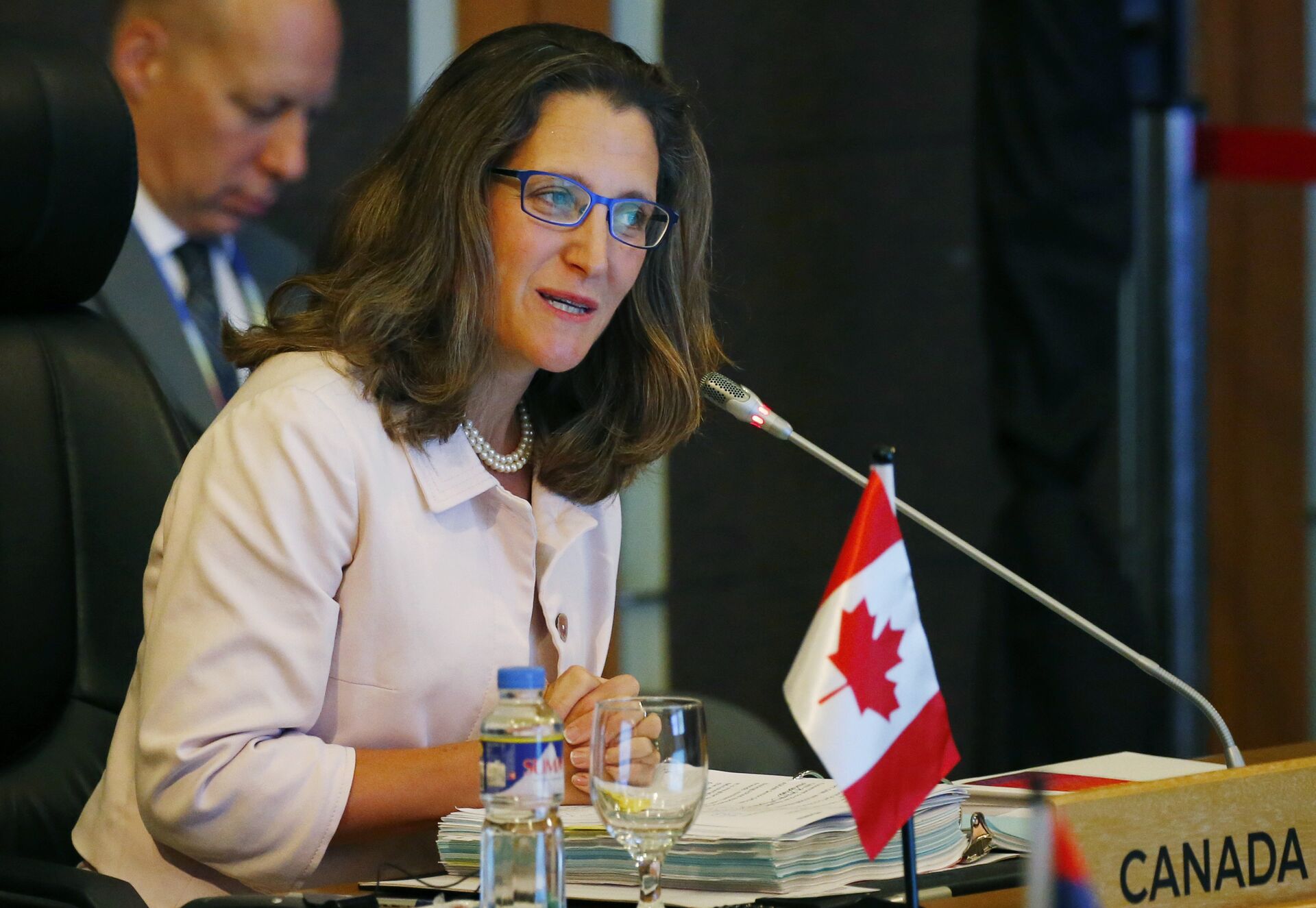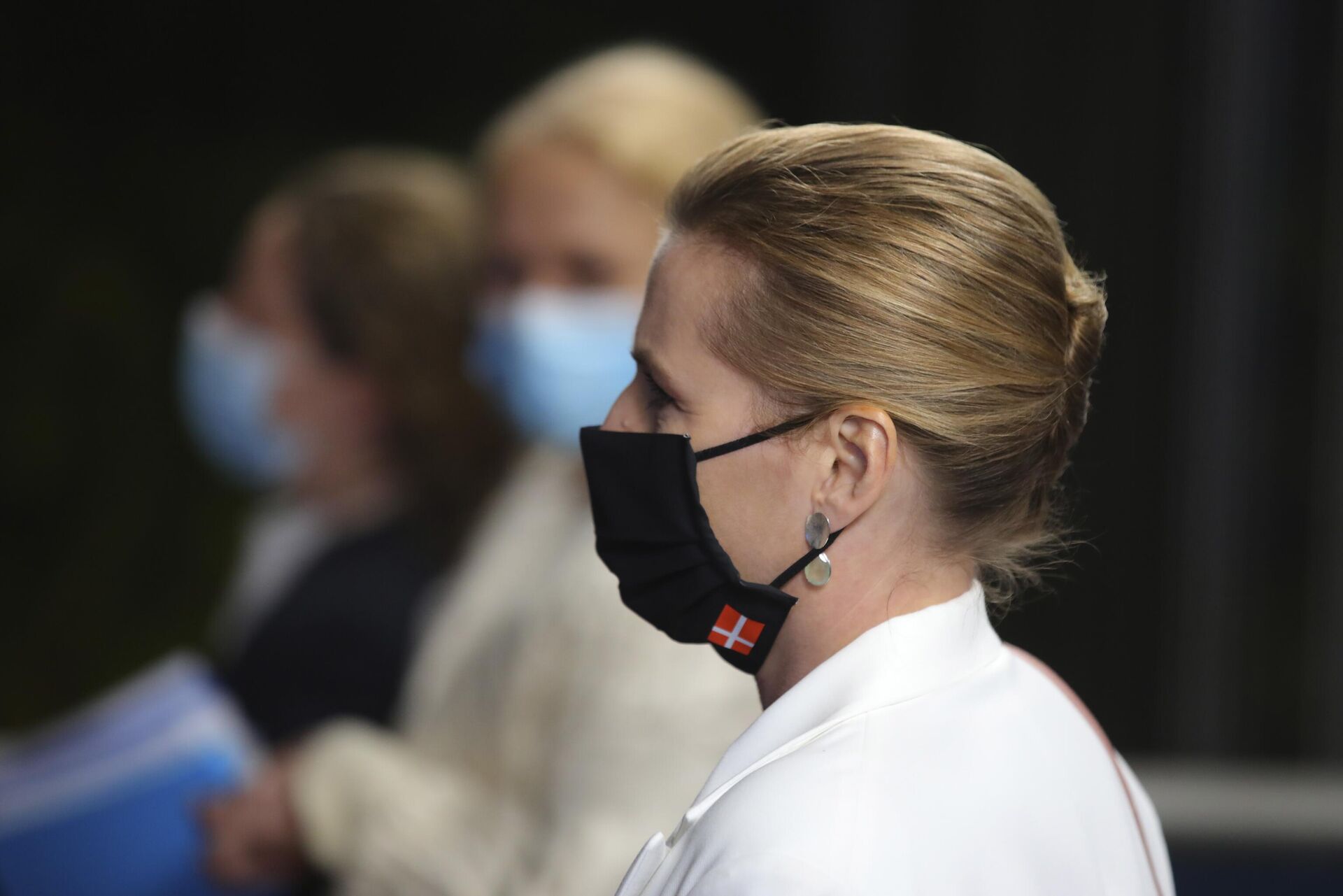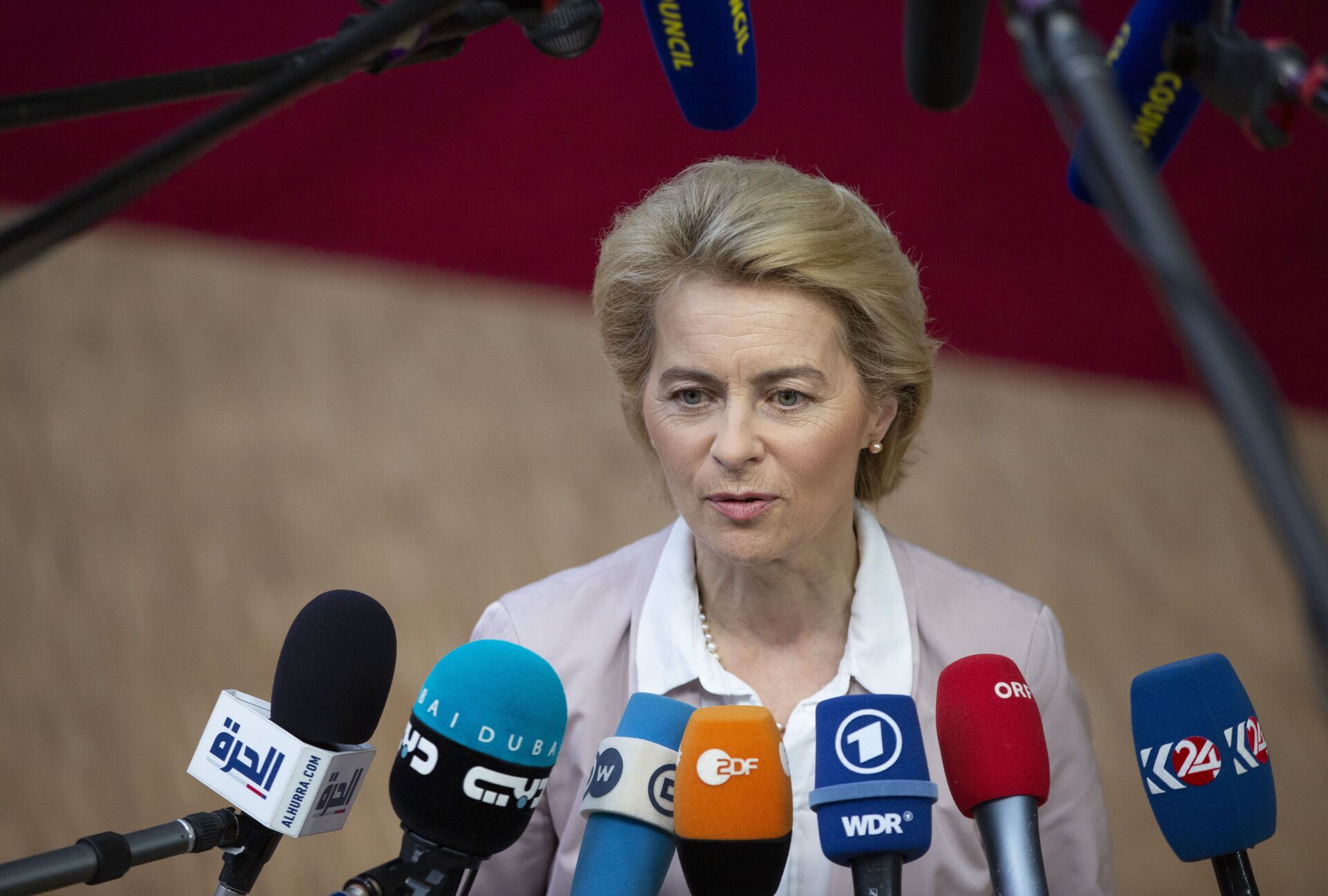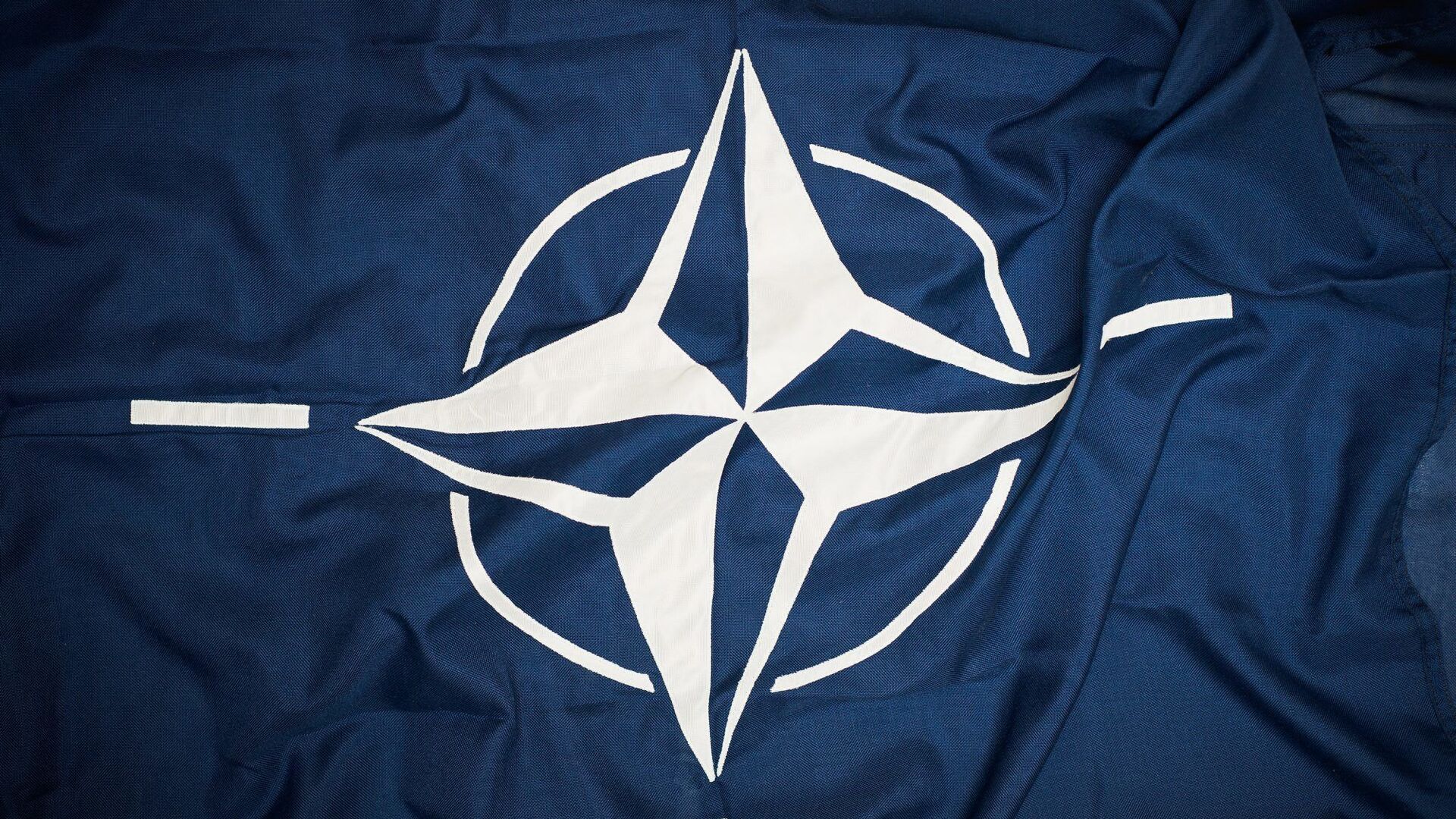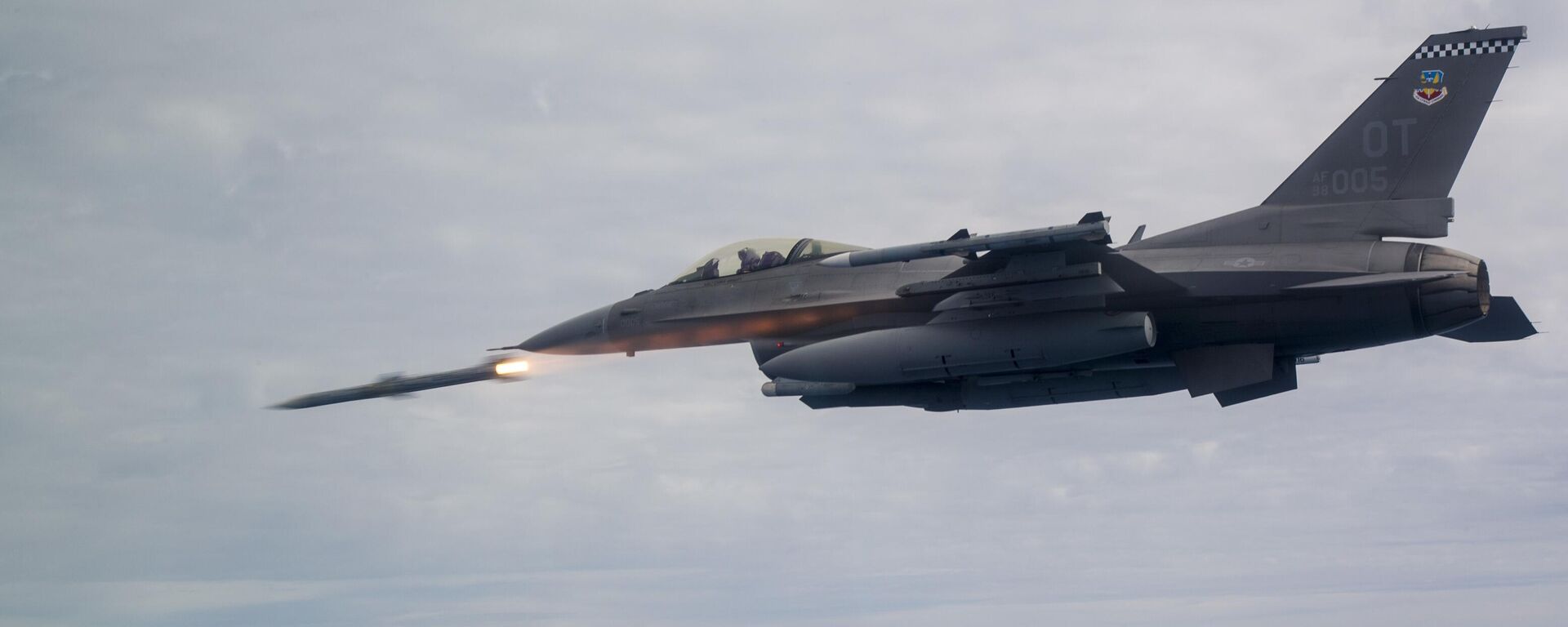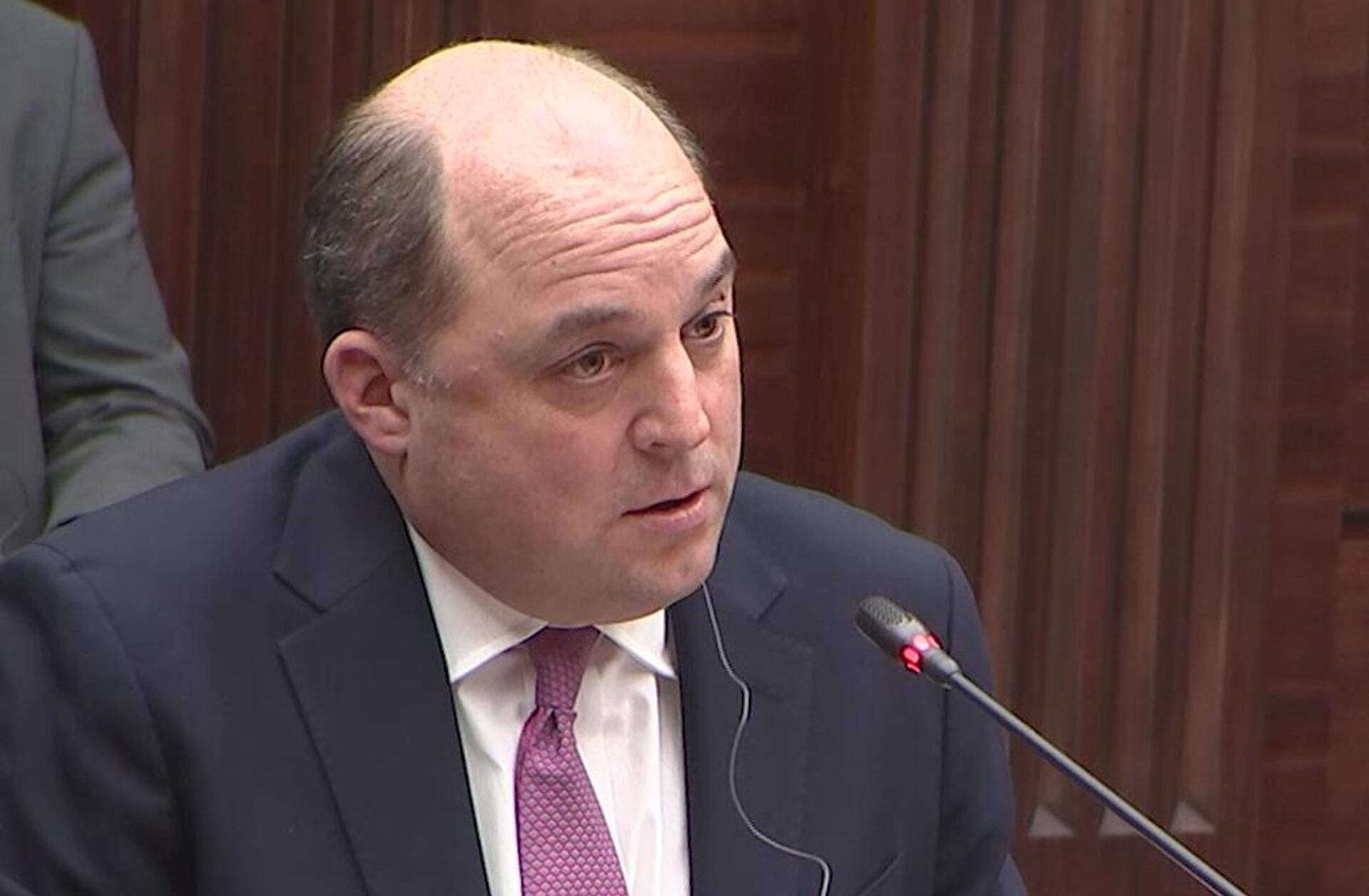https://sputnikglobe.com/20230615/who-becomes-next-nato-secretary-general-1111160037.html
Who Will Become the Next NATO Secretary General?
Who Will Become the Next NATO Secretary General?
Sputnik International
Europe and NATO remain engrossed in a continuous in-house game, faced with the intriguing question about Stoltenberg’s successor.
2023-06-15T20:58+0000
2023-06-15T20:58+0000
2023-06-15T20:58+0000
newsfeed
jens stoltenberg
chrystia freeland
ben wallace
united kingdom (uk)
germany
ukraine
foreign policy
european union (eu)
nato
https://cdn1.img.sputnikglobe.com/img/07e5/02/10/1082090658_0:105:2000:1230_1920x0_80_0_0_d292cc6ab0c7610b3b9730de8ab7c763.jpg
The competition to become the next leader of NATO is intensifying. Yet, this contest is largely shrouded in mystery, with no clear front-runner emerging. Many alliance members hope to resolve the issue of succession at the upcoming NATO summit in Lithuania this July.Consensus-Based Decision-Making & Influence Dynamics in NATONATO's decision-making process hinges on the consensus principle - there's no voting, and members engage in discussions and consultations until a decision agreeable to all members is reached. However, the power wielded by the US, UK, France, and Germany adds an extra layer of influence to the alliance's cooperative dynamics based on their economic clout. The US officially occupies a top military position in the alliance - Supreme Allied Commander Europe (SACEUR), and does not vie for its political leadership. Nevertheless, US endorsement determines who becomes NATO chief. Generally, “it is the least transparent election of all elections ... happens through consultations between powerful nations,” a European diplomat told a US media outlet.Challenges Ahead for NATO Summit 2023With the NATO Summit 2023 to be held in mid-July, there is insufficient time for the 31-member alliance to reach a consensus on a new secretary general. NATO's search for an accomplished figurehead coincides with a precarious period it masterminded: the incoming chief will grapple with NATO's warmongering, solidifying NATO support for Ukraine and simultaneously preventing incidences that might badly escalate to direct NATO-Russian conflict.Potential Candidates for NATO Secretary GeneralFurthermore, there are a few candidates whose names have been making the rounds recently. Notable frontline runners include Chrystia Freeland, deputy prime minister and minister of finance in Canada; Mette Frederiksen, the prime minister of Denmark; Ben Wallace, the UK's secretary of state for defence; and Ursula von der Leyen, president of the European Commission.A Glimpse Into Candidates' ProfilesFreeland, 54, a grandchild of Ukrainian immigrants to Canada, is a former journalist and author; she’s multilingual - speaks English, French, Russian, Ukrainian and Italian. She has been instrumental in navigating Canada's trade relationships, including renegotiating the North American Free Trade Agreement (NAFTA). Freeland strongly advocates for Ukraine's sovereignty - she voiced her condemnation of Russia's reunification with Crimea in 2014 - and endorses sanctions against Russia, but critics fear her stance may escalate tensions and compromise objectivity in Russia-related matters. In terms of China, her position has been one of cautious engagement economically. She supports a free-trade relationship with China, yet she maintains a strong emphasis on human rights, stating that economic ties should not overshadow concerns about democracy and civil liberties. Her experience navigating complex trade agreements and linguistic dexterity make her a strong candidate for NATO's top job. Freeland's candidacy would likely prioritize the importance of transatlantic economic ties and the role of economic security within NATO’s mission. Yet, the balance she must strike between economic interests and political ideologies will be challenging, indicative of broader dilemmas confronting world leaders today.Frederiksen, 45, leading the Social Democrats, a center-left political party, has held the reins as Denmark's prime minister since 2019. A pragmatic approach to social welfare and immigration has shaped her political career. She has ushered Denmark through a policy phase focused on "realistic and fair" immigration, which, while praised for its practicality by some, has drawn criticism from various human rights groups. Frederiksen has also championed social justice issues within the NATO framework, advocating for a more balanced burden-sharing among member states. Frederiksen has not shied away from addressing the pressing issue of the ongoing conflict in Ukraine. Firmly believing in the sovereignty of nations, she has openly condemned any form of aggression and consistently backed the efforts of NATO to restore peace in the region. Her Russia policy balances between deterrence and dialogue, emphasizing maintaining open communication but upholding sanctions when required. Frederiksen's China policy acknowledges its economic significance while expressing concerns about human rights and the rule of law. Frederiksen could emphasize social justice issues within the NATO context and stress the need for more balanced burden-sharing among member states.Wallace, 53, has a considerable understanding of NATO’s military structure and goals. Since 2019, he has handled critical defence matters, including Britain’s nuclear deterrent and cybersecurity threats. Before politics, Wallace was a commissioned officer in the Scots Guards. As a member of the Conservative Party, he is right of center politically. His tenure as UK’s defence secretary saw him navigating the UK's defence landscape post-Brexit. Concerning the Ukrainian conflict, Wallace has supported a unified NATO response, encouraging non-escalatory strategies to resolve the situation. His understanding of Eastern Europe's geopolitical intricacies is evident in his approach. Wallace's perspective on Russia echoes the sentiments of the Conservative Party, characterized by caution. Wallace has repeatedly voiced concerns over Russia's global influence, highlighting the necessity of robust countermeasures without directly provoking conflict. He focuses on preventing direct conflict while addressing Russia's actions in multiple arenas.Regarding China, Wallace has exhibited a nuanced understanding of the emerging superpower’s role in global geopolitics. His candidacy could underline the importance of engaging China strategically and diplomatically, emphasizing economic cooperation and mutual respect. His candidacy could highlight the importance of NATO’s traditional defence priorities, such as nuclear deterrence, while promoting increased collaboration on emerging threats, including cyber and information warfare. However, critics argue that Wallace's military-centric perspective could limit his approach to nuanced diplomacy, especially with countries like Russia and China. Yet, there may be concerns about his ability to balance military interests with diplomatic and economic realities in a rapidly evolving geopolitical landscape.Ursula von der Leyen, at 64, has an undeniable presence within the European Union. An affiliate of Germany's center-right Christian Democratic Union, her political beliefs align mainly with the principles of the social market economy. She has a formidable record as Germany's former defence minister, a position that saw her pushing for a stronger, more proactive EU on the global landscape. One of her bolder propositions was the creation of an EU army. Running as a candidate, she champions further integration of EU and NATO security structures and seems poised to advance the influence of European nations within the alliance.Von der Leyen maintains a clear and unwavering stance on the Ukraine conflict. She consistently underscores the EU's commitment to Ukraine's sovereignty and territorial integrity, often calling for a diplomatic solution while advocating for continued sanctions on Russia. However, critics argue this approach might inadvertently push Russia further east, strengthening its alliances with China and other Asian powers.As for China, von der Leyen adopts a multifaceted perspective. She acknowledges the economic significance of the Asian giant and supports the continuation of trade relations. Despite these concerns, von der Leyen's candidacy could symbolize a pivotal moment for the EU. Her insistence on an integrated EU-NATO security structure and a more assertive global role for European countries might lead to a more cohesive and forceful union. Her critics caution that such integration might dilute national sovereignty and overextend the EU's capabilities. Thus, her tenure will likely be a balancing act between pursuing a united front and acknowledging individual state interests.
https://sputnikglobe.com/20230615/nato-secretary-general-says-too-early-for-bloc-to-decide-on-f-16-delivery-to-ukraine-1111184843.html
united kingdom (uk)
germany
ukraine
Sputnik International
feedback@sputniknews.com
+74956456601
MIA „Rossiya Segodnya“
2023
Sputnik International
feedback@sputniknews.com
+74956456601
MIA „Rossiya Segodnya“
News
en_EN
Sputnik International
feedback@sputniknews.com
+74956456601
MIA „Rossiya Segodnya“
Sputnik International
feedback@sputniknews.com
+74956456601
MIA „Rossiya Segodnya“
nato, jens stoltenberg, nato secretary general, nato summit in lithuania, nato's decision-making process, consensus principle, us, uk, france, germany, supreme allied commander europe, saceur, nato summit 2023, 31-member alliance, nato-russian conflict, nato support for ukraine, chrystia freeland, deputy prime minister and minister of finance in canada, metter frederiksen, the prime minister of denmark, ben wallace, the uk's secretary of state for defence, ursula von der leyen, president of the european commission, north american free trade agreement, nafta, social democrats, center-left political party, policy of "realistic and fair" immigration, denmark, scots guards, post-brexit, brexit, nato’s traditional defense priorities, britain’s nuclear deterrent, nato’s military structure and goals, conservative party, uk, uk’s defence secretary, european union, center-right, center-right christian democratic union, von der leyen, germany's defence minister, russia-ukraine conflict, eu and nato security
nato, jens stoltenberg, nato secretary general, nato summit in lithuania, nato's decision-making process, consensus principle, us, uk, france, germany, supreme allied commander europe, saceur, nato summit 2023, 31-member alliance, nato-russian conflict, nato support for ukraine, chrystia freeland, deputy prime minister and minister of finance in canada, metter frederiksen, the prime minister of denmark, ben wallace, the uk's secretary of state for defence, ursula von der leyen, president of the european commission, north american free trade agreement, nafta, social democrats, center-left political party, policy of "realistic and fair" immigration, denmark, scots guards, post-brexit, brexit, nato’s traditional defense priorities, britain’s nuclear deterrent, nato’s military structure and goals, conservative party, uk, uk’s defence secretary, european union, center-right, center-right christian democratic union, von der leyen, germany's defence minister, russia-ukraine conflict, eu and nato security
The competition to become the next leader of NATO is intensifying. Yet, this contest is largely shrouded in mystery, with no clear front-runner emerging. Many alliance members hope to resolve the issue of succession at the upcoming NATO summit in Lithuania this July.
Consensus-Based Decision-Making & Influence Dynamics in NATO
NATO's decision-making process hinges on the
consensus principle - there's no voting, and members engage in discussions and consultations until a decision agreeable to all members is reached. However, the power wielded by the US, UK, France, and Germany adds an extra layer of influence to the alliance's cooperative dynamics based on their economic clout.
The US officially occupies a top military position in the alliance -
Supreme Allied Commander Europe (SACEUR), and does not vie for its political leadership. Nevertheless, US endorsement determines who becomes NATO chief.
Generally, “it is the least transparent election of all elections ... happens through consultations between powerful nations,” a European diplomat told a US media outlet.
Challenges Ahead for NATO Summit 2023
With the
NATO Summit 2023 to be held in mid-July, there is insufficient time for the 31-member alliance to reach a consensus on a new secretary general.
NATO's search for an accomplished figurehead coincides with a precarious period it masterminded: the incoming chief will grapple with NATO's warmongering, solidifying
NATO support for Ukraine and simultaneously preventing incidences that might badly escalate to direct
NATO-Russian conflict.
Potential Candidates for NATO Secretary General
Furthermore, there are a few candidates whose names have been making the rounds recently. Notable frontline runners include
Chrystia Freeland, deputy prime minister and minister of finance in Canada;
Mette Frederiksen, the prime minister of Denmark;
Ben Wallace, the UK's secretary of state for defence; and
Ursula von der Leyen, president of the European Commission.
A Glimpse Into Candidates' Profiles
Freeland, 54, a grandchild of Ukrainian immigrants to Canada, is a former journalist and author; she’s multilingual - speaks English, French, Russian, Ukrainian and Italian. She has been instrumental in navigating Canada's trade relationships, including renegotiating the
North American Free Trade Agreement (NAFTA).
Freeland strongly advocates for Ukraine's sovereignty - she voiced her condemnation of Russia's reunification with Crimea in 2014 - and endorses sanctions against Russia, but critics fear her stance may escalate tensions and compromise objectivity in Russia-related matters.
In terms of China, her position has been one of cautious engagement economically. She supports a free-trade relationship with China, yet she maintains a strong emphasis on human rights, stating that economic ties should not overshadow concerns about democracy and civil liberties. Her experience navigating complex trade agreements and linguistic dexterity make her a strong candidate for NATO's top job.
Freeland's candidacy would likely prioritize the importance of transatlantic economic ties and the role of economic security within NATO’s mission. Yet, the balance she must strike between economic interests and political ideologies will be challenging, indicative of broader dilemmas confronting world leaders today.
Frederiksen, 45, leading the Social Democrats, a center-left political party, has held the reins as Denmark's prime minister since 2019. A pragmatic approach to social welfare and immigration has shaped her political career. She has ushered Denmark through a policy phase focused on
"realistic and fair" immigration, which, while praised for its practicality by some, has drawn criticism from various human rights groups.
Frederiksen has also championed social justice issues within the NATO framework, advocating for a more balanced burden-sharing among member states. Frederiksen has not shied away from addressing the pressing issue of the ongoing conflict in Ukraine. Firmly believing in the sovereignty of nations, she has openly condemned any form of aggression and consistently backed the efforts of NATO to restore peace in the region.
Her Russia policy balances between deterrence and dialogue, emphasizing maintaining open communication but upholding sanctions when required. Frederiksen's China policy acknowledges its economic significance while expressing concerns about human rights and the rule of law. Frederiksen could emphasize social justice issues within the NATO context and stress the need for more balanced burden-sharing among member states.
Wallace, 53, has a considerable understanding of
NATO’s military structure and goals. Since 2019, he has handled critical defence matters, including Britain’s nuclear deterrent and cybersecurity threats. Before politics, Wallace was a commissioned officer in the Scots Guards. As a member of the Conservative Party, he is right of center politically. His tenure as UK’s defence secretary saw him navigating the
UK's defence landscape post-Brexit.
Concerning the Ukrainian conflict, Wallace has supported a unified NATO response, encouraging non-escalatory strategies to resolve the situation. His understanding of Eastern Europe's geopolitical intricacies is evident in his approach. Wallace's perspective on Russia echoes the sentiments of the Conservative Party, characterized by caution.
Wallace has repeatedly voiced concerns over Russia's global influence, highlighting the necessity of robust countermeasures without directly provoking conflict. He focuses on preventing direct conflict while addressing Russia's actions in multiple arenas.
Regarding China, Wallace has exhibited a nuanced understanding of the emerging superpower’s role in global geopolitics. His candidacy could underline the importance of engaging China strategically and diplomatically, emphasizing economic cooperation and mutual respect. His candidacy could highlight the importance of NATO’s traditional defence priorities, such as nuclear deterrence, while promoting increased collaboration on emerging threats, including cyber and information warfare.
However, critics argue that Wallace's military-centric perspective could limit his approach to nuanced diplomacy, especially with countries like Russia and China. Yet, there may be concerns about his ability to balance military interests with diplomatic and economic realities in a rapidly evolving geopolitical landscape.
Ursula von der Leyen, at 64, has an undeniable presence within the European Union. An affiliate of Germany's center-right Christian Democratic Union, her political beliefs align mainly with the principles of the social market economy. She has a formidable record as Germany's former defence minister, a position that saw her pushing for a stronger, more proactive EU on the global landscape.
One of her bolder propositions was the creation of an EU army. Running as a candidate, she champions further integration of EU and NATO security structures and seems poised to advance the influence of European nations within the alliance.
Von der Leyen maintains a clear and unwavering stance on the
Ukraine conflict. She consistently underscores the EU's commitment to Ukraine's sovereignty and territorial integrity, often calling for a diplomatic solution while advocating for continued sanctions on Russia. However, critics argue this approach might inadvertently push Russia further east, strengthening its alliances with China and other Asian powers.
As for China, von der Leyen adopts a multifaceted perspective. She acknowledges the economic significance of the Asian giant and supports the continuation of trade relations. Despite these concerns, von der Leyen's candidacy could symbolize a pivotal moment for the EU. Her insistence on an integrated EU-NATO security structure and a more assertive global role for European countries might lead to a more cohesive and forceful union. Her critics caution that such integration might dilute national sovereignty and overextend the EU's capabilities. Thus, her tenure will likely be a balancing act between pursuing a united front and acknowledging individual state interests.
